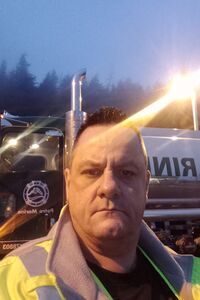A Story of Tenacity

Raised in Alaska, Robert joined the U.S. Army at age 19 and went on to serve in the National Guard. After an honorable discharge from the military he fell into drinking and drug use.
Robert described this time as a constant struggle that felt almost impossible to navigate. Robert has now been sober for over three years but it has been a rough road.
“I did it all,” he said, “using and selling. It took time for me to get out. Everything you can think of that might go badly when you are drinking and using – it happened to me.”
Struggling with Challenges
Robert was in and out of prison for a few years while he struggled with substance abuse. Depression, anxiety and insomnia heightened the challenge.
He found help and moved into a one-bedroom apartment but he was still battling his addictions. He failed to comply with the conditions of his probation and went back to prison, losing his apartment.
“That was the breaking point for me. I was tired of the chaos.”
– Robert, Alaska Housing Rent Relief Recipient
Blessing in Disguise
Reflecting on his experiences, Robert says that returning to prison the last time was the best thing that ever happened to him.
“I realized that everything bad in my life stemmed from alcohol and drug use. I wanted to be done with it.” Robert knew it would be a struggle but he says he was dedicated to getting sober.
When he was released, Robert lived in transitional housing in Juneau for 15 months. He was living there and bartending when the COVID-19 pandemic began, causing him to think seriously about what he wanted for his future.
“I realized I wasn’t getting any younger. I didn’t have a future in bartending, no retirement in that job. Now that I was sober, I wanted to go back to the kind of work I did while in the military.”
Easing a Financial Burden
Robert decided that he would pursue a commercial driver’s license (CDL) but he knew he would need help if he was going to start over and train for a new career.
Robert applied for Alaska Housing Rent Relief that eased his financial burden during the uncertainties of the pandemic and allowed him to focus on applying for funding for his CDL training. He worked toward his goal tenaciously.
Focused on Job Training
For eight months, Robert made pursuing CDL training a full-time job. He completed paperwork, wrote lengthy essays and made countless phone calls trying to piece together the funding he needed for his education. With the help of staff at the Division of Vocational Rehabilitation, JAMHI Health and Wellness (a Juneau-based organization that provides health services, community housing and counseling) and Alaska’s Department of Labor and Workforce Development, he bundled enough money to allow him to attend school in Palmer. The financial aid covered his housing, meals, transportation and tuition fees. He could finally focus on re-training and pursuing a better future.
After graduating with his CDL and moving home to Juneau, Robert started a new career as a commercial driver with Petro Marine Services, a petroleum distribution company.
He said that he loves his job and hopes to stay on until he retires.
“It’s better than I ever expected. I couldn’t have dreamed that my life would be this good. My tenacity got me where I am today.”
Grateful for an Opportunity
While he has a busy work schedule, Robert makes time to volunteer with the organizations that assisted him. He mentors others and volunteers at the Juneau Reentry Coalition. His goal is to share his story with people in prisons.
“Rental assistance lifted a financial burden,” Robert said. “It allowed me to focus on changing my life without worrying about losing my place. The combination of assistance and my own hard work has changed my life.”
We recognize that Robert’s story is exceptional and some Alaskans may be in need of safe, quality, affordable housing. If you are facing homelessness or are in need of resources, we encourage you to contact Alaska 2-1-1. This free, confidential resource can help you to locate assistance in your home community. Dial 2-1-1 or 1-800-478-2221 or visit alaska211.org.
![Alaska Housing Finance Corporation [Logo]](/application/themes/ahf2/images/logo.png?v=2)